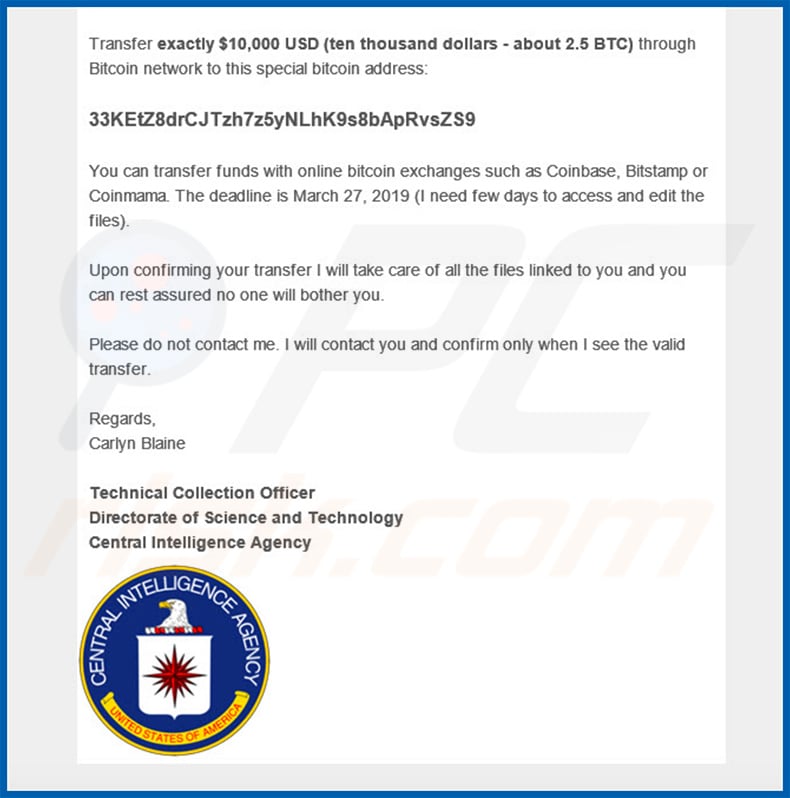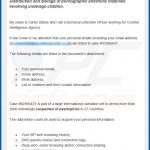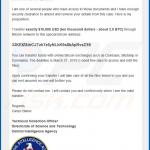Electronic Materials Involving Underage Children Email Scam
Phishing/ScamAlso Known As: Electronic Materials Involving Underage Children spam
Get free scan and check if your device is infected.
Remove it nowTo use full-featured product, you have to purchase a license for Combo Cleaner. Seven days free trial available. Combo Cleaner is owned and operated by RCS LT, the parent company of PCRisk.com.
What is "Electronic materials involving underage children"?
"Electronic materials involving underage children" is presented as an email from the Central Intelligence Agency (CIA) regarding an international paedophile case. The main purpose of this email is to trick recipients into believing that they are one of the suspects and that some of their personal information is also at risk.
To avoid problems, recipients of this email are urged to pay a specific amount in a cryptocurrency. This is a common scam used to make threats and extort money from innocent people. Do not trust this or other similar emails.

The scammer responsible for this email presents himself as a 'technical collection officer' from the CIA. The email states that the recipient's details (personal, home and work address, list of relatives and their contact details) are listed in a paedophilia case (#82956431).
It goes on to state that this case is an international operation with over 2000 people from 27 countries targeted for arrest. The first arrests are apparently scheduled for 8 April 2019. The scammer states that he is concerned about the recipient's reputation and knows about the person's supposed wealth.
The scammer claims that he is a CIA officer, one of the few people who has access to certain documents, and is capable of removing the recipient's details from them. To avoid any problems, he urges people who receive this email to pay $10,000 in Bitcoins by 27 March 27 2019.
Once this payment is made, he will supposedly ensure that any information linking the recipient to this paedophilia case will be removed/erased. People are also encouraged not to contact this officer directly but wait until he has made contact individually. As mentioned, this is simply a scam and should not be trusted. These statements are false and the CIA has nothing to do with them.
| Name | Electronic Materials Involving Underage Children Email Scam |
| Threat Type | Phishing, Scam, Social Engineering, Fraud |
| Symptoms | Unauthorized online purchases, changed online account passwords, identity theft, illegal access of one's computer. |
| Distribution methods | Deceptive emails, rogue online pop-up ads, search engine poisoning techniques, misspelled domains. |
| Damage | Loss of sensitive private information, monetary loss, identity theft. |
| Malware Removal (Windows) |
To eliminate possible malware infections, scan your computer with legitimate antivirus software. Our security researchers recommend using Combo Cleaner. Download Combo CleanerTo use full-featured product, you have to purchase a license for Combo Cleaner. 7 days free trial available. Combo Cleaner is owned and operated by RCS LT, the parent company of PCRisk.com. |
There are many scams of this kind. Scammers use them to extort money from unsuspecting people. Examples of other scams are "This Account Was Recently Infected", "Hey. It's me! Your Future Friend Or Enemy", and "I Have A Forum In The Darkweb".
These emails are harmless, and simply ignoring them is enough, however, other spam campaigns send emails that contain malicious attachments (Microsoft Office documents, archives such as ZIP, RAR, JavaScript files, executables, PDFs, and so on).
In these cases, they attempt to trick people into opening the attachments by presenting their email messages as legitimate and official. When opened, the attachments download and install malicious programs such as LokiBot, TrickBot, Emotet, AZORult, Adwind, or other high-risk computer infections.
Malicious programs proliferated through spam campaigns steal personal details (for example, banking information) that could be used to generate revenue. Having a computer infected with this malware can thus financial loss, privacy/browsing safety issues, data loss, and so on.
We receive a great deal of feedback from concerned users about this scam email. Here is the most popular question we receive:
Q: Hi pcrisk.com team, I received an email stating that my computer was hacked and they have a video of me. Now they are asking for a ransom in Bitcoins. I think this must be true because they listed my real name and password in the email. What should I do?
A: Do not worry about this email. Neither hackers nor cyber criminals have infiltrated/hacked your computer and there is no video of you watching pornography. Simply ignore the message and do not send any Bitcoins. Your email, name, and password was probably stolen from a compromised website such as Yahoo (these website breaches are common). If you are concerned, you can check if your accounts have been compromised by visiting the haveibeenpwned website.
How do spam campaigns infect computers?
Spam campaigns that include web links or attachments can cause computer infections only if opened. If the attached file is a Microsoft Office document, when opened, it will ask to disable "Protected View" mode (to enable macros commands). Granting this permission will allow malicious the document to download and install a computer infection.
Similar rules apply to each file format (an attached file or website link leading to it) - to cause any damage, the file must first be opened.
How to avoid installation of malware?
Do not open links or attachments presented in dubious, irrelevant emails (even if they are presented as official and legitimate) and those received from unknown/suspicious addresses, and so on.
All software should be downloaded from official and trustworthy sources and not third party downloaders, unofficial websites, Peer-to-Peer networks (torrent clients, eMule, and other such tools). These sources are often used to proliferate infections by presenting untrustworthy, infected files as legitimate.
Update installed software using tools/implemented functions that are provided by official developers. Do not use other third party tools. Use Microsoft Office versions that are no older than 2010, since newer versions have "Protected View" mode, which prevents malicious attachments from downloading and installing computer infections.
Additionally, avoid using tools that are used to bypass paid software activation free of charge - using these tools is illegal and might cause computer infections. Have reputable anti-virus or anti-spyware software installed and enabled. If you have already opened malicious attachments, we recommend running a scan with Combo Cleaner Antivirus for Windows to automatically eliminate infiltrated malware.
Screenshots of the entire "Electronic materials involving underage children" email message:
Text presented in the "Electronic materials involving underage children" email message:
Case #82956431
Distribution and storage of pornographic electronic materials involving underage children.
My name is Carlyn Blaine and I am a technical collection officer working for Central Intelligence Agency.
It has come to my attention that your personal details including your email address (**********************) are listed in case #82956431.
The following details are listed in the documentís attachment:
ï Your personal details,
ï Home address,
ï Work address,
ï List of relatives and their contact information.
Case #82956431 is part of a large international operation set to arrest more than 2000 individuals suspected of paedophilia in 27 countries.
The data which could be used to acquire your personal information:
ï Your ISP web browsing history,
ï DNS queries history and connection logs,
ï Deep web .onion browsing and/or connection sharing,
ï Online chat-room logs,
ï Social media activity log.
The first arrests are scheduled for April 8, 2019.
Why am I contacting you ?
I read the documentation and I know you are a wealthy person who may be concerned about reputation.
I am one of several people who have access to those documents and I have enough security clearance to amend and remove your details from this case. Here is my proposition.
Transfer exactly $10,000 USD (ten thousand dollars ñ about 2.5 BTC) through Bitcoin network to this special bitcoin address:
33KEtZ8drCJTzh7z5yNLhK9s8bApRvsZS9
You can transfer funds with online bitcoin exchanges such as Coinbase, Bitstamp or Coinmama. The deadline is March 27, 2019 (I need few days to access and edit the files).
Upon confirming your transfer I will take care of all the files linked to you and you can rest assured no one will bother you.
Please do not contact me. I will contact you and confirm only when I see the valid transfer.
Regards,
Carlyn Blaine
Technical Collection Officer
Directorate of Science and Technology
Central Intelligence Agency
Instant automatic malware removal:
Manual threat removal might be a lengthy and complicated process that requires advanced IT skills. Combo Cleaner is a professional automatic malware removal tool that is recommended to get rid of malware. Download it by clicking the button below:
DOWNLOAD Combo CleanerBy downloading any software listed on this website you agree to our Privacy Policy and Terms of Use. To use full-featured product, you have to purchase a license for Combo Cleaner. 7 days free trial available. Combo Cleaner is owned and operated by RCS LT, the parent company of PCRisk.com.
Quick menu:
- What is Electronic Materials Involving Underage Children spam?
- Types of malicious emails.
- How to spot a malicious email?
- What to do if you fell for an email scam?
Types of malicious emails:
![]() Phishing Emails
Phishing Emails
Most commonly, cybercriminals use deceptive emails to trick Internet users into giving away their sensitive private information, for example, login information for various online services, email accounts, or online banking information.
Such attacks are called phishing. In a phishing attack, cybercriminals usually send an email message with some popular service logo (for example, Microsoft, DHL, Amazon, Netflix), create urgency (wrong shipping address, expired password, etc.), and place a link which they hope their potential victims will click on.
After clicking the link presented in such email message, victims are redirected to a fake website that looks identical or extremely similar to the original one. Victims are then asked to enter their password, credit card details, or some other information that gets stolen by cybercriminals.
![]() Emails with Malicious Attachments
Emails with Malicious Attachments
Another popular attack vector is email spam with malicious attachments that infect users' computers with malware. Malicious attachments usually carry trojans that are capable of stealing passwords, banking information, and other sensitive information.
In such attacks, cybercriminals' main goal is to trick their potential victims into opening an infected email attachment. To achieve this goal, email messages usually talk about recently received invoices, faxes, or voice messages.
If a potential victim falls for the lure and opens the attachment, their computers get infected, and cybercriminals can collect a lot of sensitive information.
While it's a more complicated method to steal personal information (spam filters and antivirus programs usually detect such attempts), if successful, cybercriminals can get a much wider array of data and can collect information for a long period of time.
![]() Sextortion Emails
Sextortion Emails
This is a type of phishing. In this case, users receive an email claiming that a cybercriminal could access the webcam of the potential victim and has a video recording of one's masturbation.
To get rid of the video, victims are asked to pay a ransom (usually using Bitcoin or another cryptocurrency). Nevertheless, all of these claims are false - users who receive such emails should ignore and delete them.
How to spot a malicious email?
While cyber criminals try to make their lure emails look trustworthy, here are some things that you should look for when trying to spot a phishing email:
- Check the sender's ("from") email address: Hover your mouse over the "from" address and check if it's legitimate. For example, if you received an email from Microsoft, be sure to check if the email address is @microsoft.com and not something suspicious like @m1crosoft.com, @microsfot.com, @account-security-noreply.com, etc.
- Check for generic greetings: If the greeting in the email is "Dear user", "Dear @youremail.com", "Dear valued customer", this should raise suspiciousness. Most commonly, companies call you by your name. Lack of this information could signal a phishing attempt.
- Check the links in the email: Hover your mouse over the link presented in the email, if the link that appears seems suspicious, don't click it. For example, if you received an email from Microsoft and the link in the email shows that it will go to firebasestorage.googleapis.com/v0... you shouldn't trust it. It's best not to click any links in the emails but to visit the company website that sent you the email in the first place.
- Don't blindly trust email attachments: Most commonly, legitimate companies will ask you to log in to their website and to view any documents there; if you received an email with an attachment, it's a good idea to scan it with an antivirus application. Infected email attachments are a common attack vector used by cybercriminals.
To minimise the risk of opening phishing and malicious emails we recommend using Combo Cleaner Antivirus for Windows.
Example of a spam email:

What to do if you fell for an email scam?
- If you clicked on a link in a phishing email and entered your password - be sure to change your password as soon as possible. Usually, cybercriminals collect stolen credentials and then sell them to other groups that use them for malicious purposes. If you change your password in a timely manner, there's a chance that criminals won't have enough time to do any damage.
- If you entered your credit card information - contact your bank as soon as possible and explain the situation. There's a good chance that you will need to cancel your compromised credit card and get a new one.
- If you see any signs of identity theft - you should immediately contact the Federal Trade Commission. This institution will collect information about your situation and create a personal recovery plan.
- If you opened a malicious attachment - your computer is probably infected, you should scan it with a reputable antivirus application. For this purpose, we recommend using Combo Cleaner Antivirus for Windows.
- Help other Internet users - report phishing emails to Anti-Phishing Working Group, FBI’s Internet Crime Complaint Center, National Fraud Information Center and U.S. Department of Justice.
Share:

Tomas Meskauskas
Expert security researcher, professional malware analyst
I am passionate about computer security and technology. I have an experience of over 10 years working in various companies related to computer technical issue solving and Internet security. I have been working as an author and editor for pcrisk.com since 2010. Follow me on Twitter and LinkedIn to stay informed about the latest online security threats.
PCrisk security portal is brought by a company RCS LT.
Joined forces of security researchers help educate computer users about the latest online security threats. More information about the company RCS LT.
Our malware removal guides are free. However, if you want to support us you can send us a donation.
DonatePCrisk security portal is brought by a company RCS LT.
Joined forces of security researchers help educate computer users about the latest online security threats. More information about the company RCS LT.
Our malware removal guides are free. However, if you want to support us you can send us a donation.
Donate


▼ Show Discussion